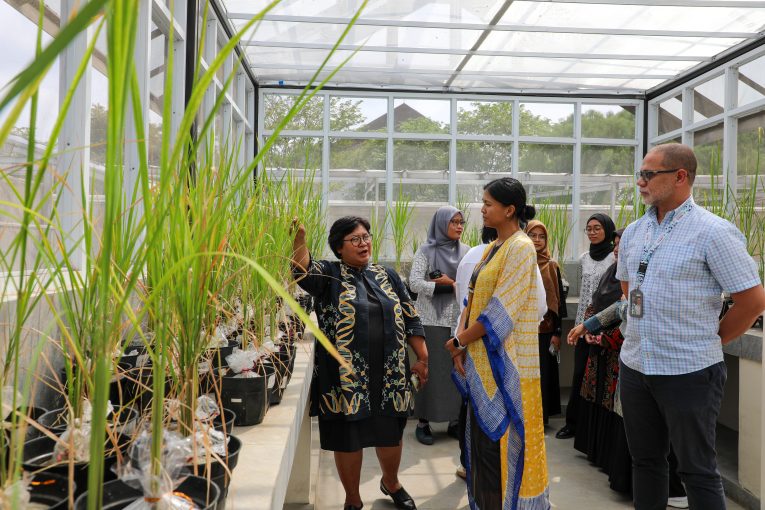
Strengthening Food Security Through Innovation in Climate-Resilient Local Rice Varieties
Food security cannot be achieved by a single entity alone. Amid the growing challenges of global climate change, Indonesia needs collaboration across sectors and nations to strengthen its food systems from the ground up.
One of these collaborative efforts is embodied in the research project “Building a Sustainable Future: Developing Nutritious and Climate-Resilient Crop Varieties.” The project brings together researchers from Universitas Gadjah Mada (UGM), the National Research and Innovation Agency (BRIN), the International Rice Research Institute (IRRI), and the Australian National University (ANU). Through this partnership, the team aims to develop local rice varieties that are not only more resistant to climate stress but also richer in nutritional value.
Among the researchers involved is Prof. Dr. Yekti Asih Purwestri, Professor of Molecular Biochemistry at the Faculty of Biology UGM. Her work focuses on optimizing the genetic potential of pigmented rice varieties as sources of functional food.
“Functional food is not only about providing energy,” explained Prof. Yekti. “It also offers added health benefits, black rice, for example, is rich in anthocyanins that act as natural antioxidants.”
Pigmented rice varieties, such as red and black rice, often receive less attention in the commercial market, despite their significantly higher levels of antioxidants and micronutrients compared to white rice. Some even contain resistant starch, which helps regulate blood sugar levels.
From Laboratory to Rice Fields
Prof. Yekti explained that many local rice varieties naturally possess resilience to extreme conditions such as drought.
“We aim to uncover the genetic mechanisms responsible for drought tolerance,” she said. “Some local cultivars from East Nusa Tenggara (NTT) already show remarkable drought resistance, and we want to understand their genetic basis so they can be developed into superior varieties.”
To achieve this, the research team utilizes genome editing technology, which is often misunderstood as genetic modification (GMO). However, the principle is different.
“Genome editing does not add new genes from other organisms,” clarified Yekti. “It simply optimizes the genetic potential already present within the plant.”
The method can be likened to editing a long manuscript, without adding new words, but refining existing sentences to make them more effective. In plants, this means “editing” genes responsible for vulnerability to drought so that the resulting varieties remain genetically pure but stronger and more adaptive to extreme conditions.
Through this approach, the research holds the potential to produce rice varieties that are not only productive but also climate-resilient, an important step toward achieving national food security.
Strengthening the Ecosystem for Food Research and Innovation
According to Prof. Yekti, the success of research is not solely determined by scientific achievements in the laboratory but also by its real impact on society.
“Research must stay connected with farmers and industry,” she emphasized. “If the varieties we develop are drought-tolerant, nutritious, and economically valuable, then our work contributes not only to science but also to farmers’ welfare.”
The project fosters collaboration across multiple sectors, from local farmers to international research institutions. Direct communication with farmers plays an essential role in ensuring that scientific findings are applicable and relevant to field conditions.
Interestingly, this initiative has also sparked public curiosity. Many local residents have shown keen interest and often inquire about the project’s progress, an encouraging sign that science can be meaningfully integrated into community life.
Looking ahead, Prof. Yekti hopes that Indonesia will strengthen its domestic genomic research facilities so that analyses no longer need to be conducted abroad. She believes that Indonesia has strong human resource potential; what is needed are better research infrastructures and long-term commitment to achieving self-reliance in genomic research.
The journey of Prof. Yekti and her team demonstrates that innovation does not always have to come from outside. By harnessing local potential, integrating modern science, and involving the community from the outset, food security can be built sustainably, inclusively, and rooted in local wisdom.
